December 2011
Interview by the German newspaper Die Zeit
History of Medicine Unit Director Jonathan Reinarz was interviewed by the German newspaper Die Zeit and spoke to one of its journalists on the subject of his research on the history of the senses. Jonathan, who is writing a book on the history of smell which will be published with University of Northern Illinois Press, discussed the way in which the history of the senses has the potential to shed new light on familiar historical topics. To read the interview, click here: http://www.zeit.de/karriere/beruf/2011-12/beruf-geruchsforscher/komplettansicht
John Ash Lecture: 8 December 2011
To watch and hear the John Ash Lecture given by Professor Simon Szreter, University of Cambridge entitled ‘Birmingham, Birmingham University and the Public Health History of the Nation’
November 2011
Three-way Podcast with Julia Hyland, Dr June Jones and volunteer students using ‘medical effects’make-up
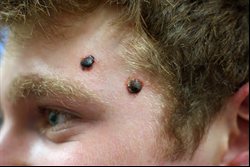 Julia Hyland has been using her ‘medical effects’ skills to make up volunteer Ethics and History of Medicine students with a variety of skin conditions (ringworm, psoriasis, eczema, chicken pox, kaposi’s sarcoma) as part of a joint research project with Dr June Jones into the under-diagnosis and misrepresentation of skin conditions on different skin tones. A three-way podcast has been produced in which Julia, June and the students will discuss the skin conditions ‘given’ to them, hopefully making for a lively and interactive session.
Julia Hyland has been using her ‘medical effects’ skills to make up volunteer Ethics and History of Medicine students with a variety of skin conditions (ringworm, psoriasis, eczema, chicken pox, kaposi’s sarcoma) as part of a joint research project with Dr June Jones into the under-diagnosis and misrepresentation of skin conditions on different skin tones. A three-way podcast has been produced in which Julia, June and the students will discuss the skin conditions ‘given’ to them, hopefully making for a lively and interactive session.
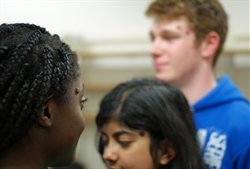 Last year, June supervised a student’s SP1 project on the lack of ethnically diverse images available for dermatologists and GPs. As part of their current diagnostic process, doctors can search a data base of images in dermatology, but our student found that only 2% of those images feature patients with darker skin tones. The risk therefore is that patients with darker skin tones may be under-diagnosed and, consequently, under-treated, or even mistreated. As our patient population in the West Midlands is particularly diverse, this is an especially relevant issue for Birmingham medical professionals.
Last year, June supervised a student’s SP1 project on the lack of ethnically diverse images available for dermatologists and GPs. As part of their current diagnostic process, doctors can search a data base of images in dermatology, but our student found that only 2% of those images feature patients with darker skin tones. The risk therefore is that patients with darker skin tones may be under-diagnosed and, consequently, under-treated, or even mistreated. As our patient population in the West Midlands is particularly diverse, this is an especially relevant issue for Birmingham medical professionals.
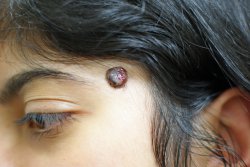 Julia and June want to run CPD courses for GPs and dermatologists in training in order to provide opportunities to see what dermatological conditions look like on different skin tones. Before these courses run we invited a group of students to be made up to wear a variety of skin conditions applied as part of the podcast in order that Julia could practice and perfect her repertoire. They recruited students with a variety of skin tones as the conditions often present differently, sometimes radically so.
Julia and June want to run CPD courses for GPs and dermatologists in training in order to provide opportunities to see what dermatological conditions look like on different skin tones. Before these courses run we invited a group of students to be made up to wear a variety of skin conditions applied as part of the podcast in order that Julia could practice and perfect her repertoire. They recruited students with a variety of skin tones as the conditions often present differently, sometimes radically so.
Julia Hyland Medical Effects Makeup
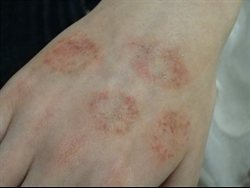 |
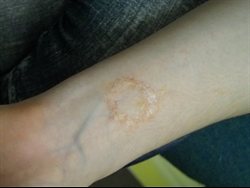 |
October 2011
Former PhD student in the History of Medicine Unit, Richard Moore has had his research published by the Amberley Press. Based on his PhD thesis, Shropshire Doctors & Quacks charts the emergence of modern healthcare systems in the provincial shires from the 18th through to the 21st century. Brought to life with case studies, cartoons and anecdotes from numerous historical archives, Moore’s study applies its lessons to healthcare in the past, present and future, both in the provincial and national contexts. Our congratulations to Richard for this important contribution to the fields of medical and regional history. More information about the book
July 2011
Julia Hyland, Outreach for the History of Medicine Unit is working her disease magic at a number of summer events here at the University and also around the country. Please check out the links below supporting the news items or contact the Unit directly if you would like more information
Summer School; University of Birmingham, 15 and 19 July 2011
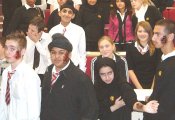 Two hundred 14 and 15 year olds from across the West Midlands will be experiencing university life this July when they attend UniFest Summer Schools here at the University of Birmingham.
Two hundred 14 and 15 year olds from across the West Midlands will be experiencing university life this July when they attend UniFest Summer Schools here at the University of Birmingham.
The Year 10 students have the opportunity to experience lectures, seminars and interactive workshops on diverse topics from the history of medicine to Mandarin Chinese.
What diseases did medieval people suffer from? What were the treatments? Would you roast someone in mercury to treat for Plague? Find out as Julia realistically recreates bubonic plague and other contagious conditions.
http://www.birmingham.ac.uk/news/latest/2010/07/09july-UniFest.aspx
--------------------------------------------------------------
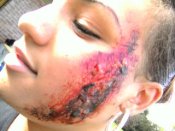 Aim Higher; University of Birmingham, 7 July 2011, Birmingham
Aim Higher; University of Birmingham, 7 July 2011, Birmingham
As part of the University’s Aimhigher programme Julia Hyland will be giving a talk and demonstration on nineteenth century surgery to introduce students to the history of medicine. Smallpox and scabies and boils and burns are all on the menu.
Aimhigher encompasses a wide range of activities to engage and motivate students and young people aged 13-30 from all walks of life, who have the potential to enter higher education but are under-achieving, undecided or lacking in confidence. The programme particularly focuses on young people from disadvantaged social and economic backgrounds, looked after children in the care system and the disabled or learners with a specific learning difference.
Aimhigher is a national programme which aims to widen participation in higher education (HE) by raising the aspirations and developing the abilities of young people from under-represented groups.
--------------------------------------------------------------
Gladiator Games: Stories of the World, Festival of British Archaeology , Museum of London, Saturday 30 & Sunday 31 July 2011, London

Stories of the World is a national project that encourages young people in the UK to explore, engage with and influence museum collections and historic sites, challenging them to tell their stories, and the stories of the world, through a wide variety of activities.
Join Museum of London curators and archaeologists as we celebrate the Festival of British Archaeology with a range of show-stopping Roman themed events and activities. Handle Roman objects, tour excavation sites, see the remains of some real Roman Londoners and watch a gladiator show on the site of London's original amphitheatre. Experience what it would be like to have your gladiator wounds treated. Learn about Galen, physician and surgeon to the gladiators with Julia Hyland from the University of Birmingham. For more information, please see:
http://www.museumoflondon.org.uk/London-Wall/Whats-on/Events/FeaturedEvents/FestivalofBritishArchaeology.htm
http://www.museumoflondon.org.uk/Get-involved/Collaborative-projects/Stories-of-the-World/
--------------------------------------------------------------
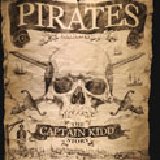 Pirates Sleepover, Museum of Docklands, Friday 1 July 2011, London
Pirates Sleepover, Museum of Docklands, Friday 1 July 2011, London
Julia Hyland will be exploring cutlass and sword wounds, scurvy and gangrene as part of the Pirate Exhibition at the Museum of the Docklands in London. Original artefacts, archaeological finds and hands-on activities will reveal London’s links with piracy dating back to the 17th century, including the capital’s gruesome history as a place of execution for pirates. Through maps, letters and illustrations, follow the true story of the infamous Captain Kidd, who met his end at Wapping’s Execution Dock, passing into legend to shape our ideas of pirates today.
June
Wellcome Trust Community Picnic Saturday 25 June 2011, London
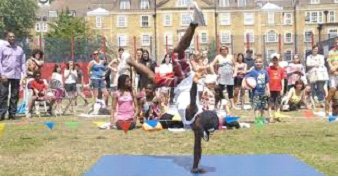 The Wellcome Community Midsummer Picnic with experiments, demonstrations, performances, food and fun. Get involved in the Science Boffins' show, meet Jones the Bones, make and launch a rocket, or just enjoy a picnic in the park.
The Wellcome Community Midsummer Picnic with experiments, demonstrations, performances, food and fun. Get involved in the Science Boffins' show, meet Jones the Bones, make and launch a rocket, or just enjoy a picnic in the park.
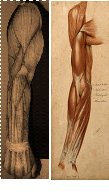 Julia Hyland from the History of Medicine Unit will showing people how to paint ecorche (flayed skin) onto themselves. There will be plenty of hands-on activities for all ages.
Julia Hyland from the History of Medicine Unit will showing people how to paint ecorche (flayed skin) onto themselves. There will be plenty of hands-on activities for all ages.
May
Stuart Wildman, a PhD student in the Unit, and a member of the academic staff of Nursing & Physiotherapy at Birmingham, presented a paper at an international conference on nursing history in Berlin, organised by the Institute for the History of Medicine at the Robert Bosch Foundation (Stuttgart). The conference was held at the Berliner Medizinhistorisches Museum der Charité (Museum of Medical History at the Charité Hospital), 12-14 May 2011. Stuart presented a paper based on his doctoral research, entitled ‘“Docile bodies” or “impudent” women: conflicts between nurses and their employers in England, 1870 -1914’. To correspond with the conference, the museum is currently hosting an exhibition on the history of nursing, entitled ‘Who Cares?’, which runs until January 2012.
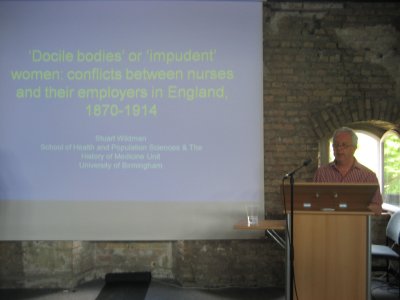
Stuart presenting his paper
--------------------------------------------------------------
Congratulations to Elaine Boyling who successfully defended her PhD thesis on 11 May 2011. Elaine’s thesis was entitled ‘Quakerism and Therapeutic Environments: dynamic resources in the management of a Therapeutic Community 1962-1995’. The research was part-funded by the Planned Environments Therapy Trust (PETT), Toddington, and was also supported by the Wellcome Trust. The project was supervised by Dr Jonathan Reinarz and PETT Archivist Dr Craig Fees. Elaine has also recently accepted a job as Research Fellow at the University of Calgary, Canada where she will investigate doctors’ understandings of indigenous healthcare in Canada. Well done on both counts, Elaine.
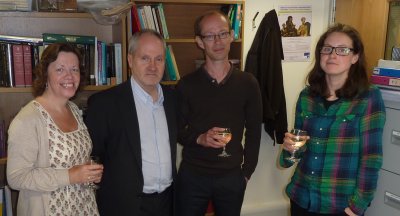
Elaine begins to unwind after the viva with her examiners, Dr Mathew Thomson and Professor Ian Grosvenor, and viva Chair, Dr June Jones
April
History of Medicine graduate student Elaine Boyling had an article published in the April 2011 issue of Social History of Medicine, a leading academic journal in the field. The article, entitled ‘Being Able to Learn: Researching the History of a Therapeutic Community’, was based on Elaine’s PhD research on a British therapeutic community in the second half of the twentieth century.
The abstract of the article can be found here: http://shm.oxfordjournals.org/content/24/1/151.abstract
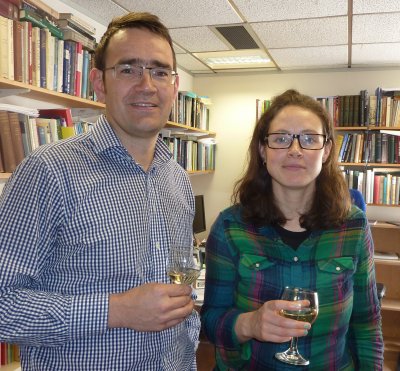
Elaine Boyling and her lead supervisor, Dr Jonathan Reinarz, toast the successful viva
--------------------------------------------------------------
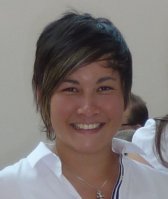 Former student Rachel Wong has won the Royal Society of Medicine's Anaesthesia Essay Prize for Students for an essay she wrote while enrolled with the Unit. Rachel's essay was completed as part of the Medical Specialisations module in the BMedSc (Intercalation) Course and was entitled, 'Was the development of Anaesthesia as a medical specialty, a reaction to scientific innovation or a necessity caused by nineteenth-century surgical practice?' She will be presenting it on 3 June 2011 in London at the RSM.
Former student Rachel Wong has won the Royal Society of Medicine's Anaesthesia Essay Prize for Students for an essay she wrote while enrolled with the Unit. Rachel's essay was completed as part of the Medical Specialisations module in the BMedSc (Intercalation) Course and was entitled, 'Was the development of Anaesthesia as a medical specialty, a reaction to scientific innovation or a necessity caused by nineteenth-century surgical practice?' She will be presenting it on 3 June 2011 in London at the RSM.
--------------------------------------------------------------
Dr Jonathan Reinarz participated in the International Network for the History of Hospital's annual conference in Portugal from 8-10 April 2011. Jonathan delivered a talk in the final keynote slot at the Network's sixth annual conference on 'Daily Life in the Hospital', which was held in Lisbon and Evora. Also at the conference was Sarah York, a former post-graduate student at the Unit and now a Research Fellow on a project jointly managed by the University of Warwick and University College Dublin.
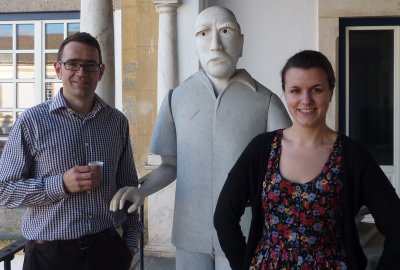
Jonathan and Sarah with one of the more reserved Portuguese delegates at the University of Evora, Portugal
March
Congratulations to Antonia Morgan-Forster who on 28 March successfully defended her thesis in what she described as 'a very enjoyable viva'. Entitled 'Malaria and the prehistoric Aegean', the thesis considered the effects of the disease on populations in the Aegean region from c.8600 to c.1100 BC. Well done Antonia!
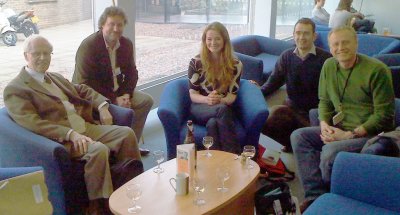
The post-viva celebration. From left to right: Professor Don Brothwell (External Examiner), Dr Andy Howard (Internal Examiner), Ms Antonia Morgan-Forster, Dr Jonathan Reinarz (Head of History of Medicine) and Dr Warren Eastwood (Antonia's Lead Supervisor).
--------------------------------------------------------------
On 2 March, Unit members joined residents of Handsworth at Handsworth Library to inaugurate an exhibition looking at health in the community over the last century. The Handsworth Health and Heritage project was conceived in 2010 as a means of creating and producing a locally-based exhibition which could explore aspects of health development, attitudes and changes over a period of time in order to better understand how a community’s health can impact upon its sense of place and development. A small group of voluntary health researchers drawn from the local community, joined by Jonathan Reinarz, Len Smith and Julia Hyland, produced exhibits on food and nutrition, diabetes, disability, maternity and mental health services, as well as Handsworth’s first medical officers of health. These will be displayed at Handsworth Library during the month of March. For more information on the project, please visit www.handsonhandsworth.org
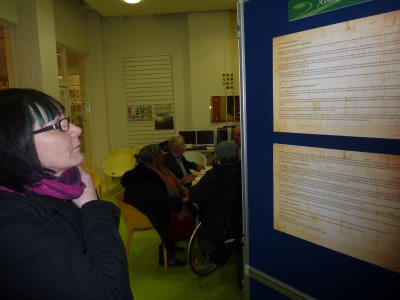
Julia Hyland taking in some of the findings of the Handsworth Health and Heritage project
February
A read-through of Jenny Stephens's script, entitled Shell Shock, was held at the King's Heath 202 Field Hospital on 3 February before an audience of approximately 50 people, comprising academics, school children, army personnel and other members of the community. The project is a collaboration between the History of Medicine Unit and the Birmingham REP Theatre. After a very positive response by those present, the project's steering committee will now be putting together an application for another grant in order to bring the full production to wider audiences in Birmingham and hopefully commence a larger tour of Britain.
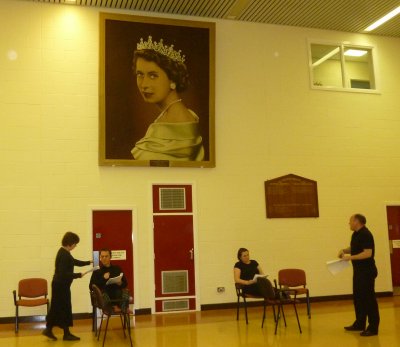
The drama unfolds in an army hospital
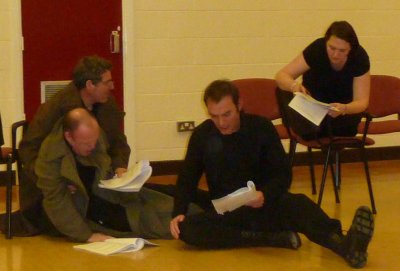
The actors convincingly recreate the trauma of trench warfare in Ypres during WWI